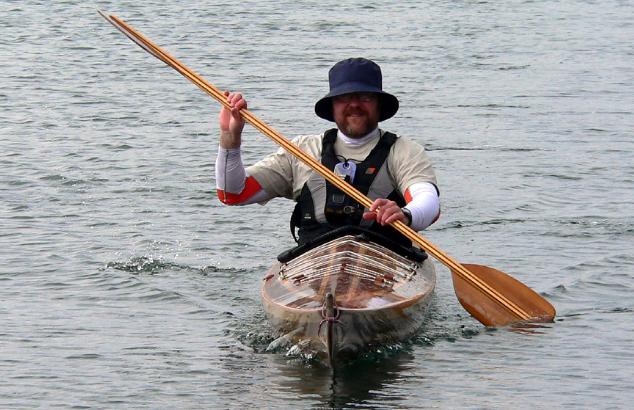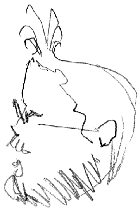|
||||||||||||||||||||||||||||||||||||||||||||||||||||||||||||||||||||||||||||||||||||||||||||||||||||||||||||||||||||||||||||||||||||||||||||||||||
Etienne Muller was born in South Africa in 1957 and has lived in Co. Kerry Ireland since 1997 where he runs the family art gallery, Brushwood Studios, near the village of Sneem, and has a small publishing company. He enjoys building wooden boats, sea-kayaking with his friends, windsurfing, playing the guitar and attempting to express his philosophical outlook in the occasional poem. Regarding Poetry: Being a remorselessly cheerful and extrovert sort I find it an elusive task to access that melancholy that seems requisite in a dedicated poet. Since childhood though, I have always scribbled my thoughts in an attempt to find focus and clarity. To attempt to raise those efforts to expression in what has been called the highest art form is a presumption on my part, yet I have spent many enjoyable hours in that pursuit, and achieved many moments of intense satisfaction with a line or phrase. While I would like to pen soaring inspirational poems, complete and perfect in structure, cadence and meaning, that highest level of refinement seems to belong to only very few of the greatest souls and minds throughout history, and then only sometimes. Also I have had heart-pounding moments of epiphany and connection with the minds and insights of poets, writers and song-smiths who fall far short of this ideal. So I endeavour occasionally, as the fancy takes me, to mull over and express thoughts both inspirational and mundane in my imperfect way and dream dreams of a modest fame, if only among my friends. Regarding life: Take a long hard objective look at the human species, in the western world in particular, and one has to ask oneself if there is really much difference between human and animal goals and behaviour. We like to think that we operate from a starting point of free will, and that we have conscious goals and a sense of control over our destiny that animals do not. We feel that we have a long term overview of our lives and that our actions do not stem from the promptings of instinct as they do in the animal kingdom. We do not fly south when the urge comes upon us, we do not get the urge to mate every spring come what may, we are not compelled to lock horns with our rivals during the rutting season in an attempt to promote our own genes above those of another, we are not consumed with the urge to gather and store nuts every autumn, and so on. Or are we? Animals, lacking that abstract sense of the passing of a lifetime, exist within the rhythms of the day and of the seasons. Their instincts spur them to to do whatever is right for the species at any particular time of the year. We know that, with our abstract self-consciousness and the control we have over our environments, we need not be consumed with these urges. However, imagine you were an alien anthropologist, taking an overview of the human race as a species, knowing that, beyond just living, humans were conscious of life-span. An objective study would reveal that, far from doing as they wish, humans entered the rat-race soon after birth. At the age of about four or five they would be introduced to the concept of competition and they will be consumed with this imperative for the rest of their lives. By the time the human has passed into adulthood they will have been bonded to their culture in all sorts of ways, subtle and overt, through the processes of allegiance, dependance, acceptance, fear, prejudice and so on and on and on. The next phase of the life-cycle will involve the very basic instinctual imperative common to almost all species of Earth animal. The manoeuvring processes for status and position within the pecking order. Males will go to extreme measures to impress the female human as well as to dominate the other males. Depending on their abilities, and the society to which they are bonded, they will adorn themselves, sometimes at great expense. Some will clothe themselves in a BMW, others in a Mercedes, others still may wear a Harley Davidson. So important are these symbols of the human’s ability to compete, the house, the car, the clothes, the restaurants, that they will frequently indenture themselves for life to occupations that they loathe. The female human, in an effort to attract the attention of the male, often drab without his plumage, will often starve herself and has even been known to undergo various forms of physical mutilation in an effort to rise in the pecking order. During this phase of the human life-cycle the urge to procreate will almost inevitably overcome paired humans. Yes, humans, who pride themselves on their ability to reason and access logical thought, even though the species is critically overpopulating its habitats, will succumb to this most basic of animal imperatives: the propagation of the species. When this is achieved another basic instinct common to most higher animals comes to the fore. That of caring for their young. Human offspring require decades of nurturing before they are properly able to fend for themselves. They are also comparatively intelligent and can therefore be quite wilful and are often a trial to their parents who have been known to become exhausted in this process. However, on the whole the parenting instinct is strong, overcoming all rational thought, and prevails through most difficulties. The second effect of human propagation, also in common with many other species, is that of draining the resources of time, food and habitat. The result of this is that human pairs in this phase are usually stretched well beyond the limits of rational behaviour. So strong is the parenting instinct, that humans will even force their children to take on the obviously flawed values and prerogatives that they themselves are slaves to. They will compete even harder to climb the social ladder and can be so distracted by the details of their daily grind that they have little time, nor the inclination, to examine the quality of their relationships or their lifestyle rationale. It is often, due to the pressures of this phase, that the human couple bonds will fail. The post parenting phase for the human, usually lasting about fifteen to twenty years, is the acorn gathering phase. The kids are now, theoretically, self-sufficient and the realisation sets in with a vengeance that old age, and its effect on survival capability, is inevitable, and the age old fear of a hard winter compel the human to work diligently towards a good harvest. It is known that this harvest, when reaped, is subject to one of the most fundamental laws of the universe: the law of diminishing returns. There are parasites everywhere eating into the winter reserve. For this reason excess needs to be accumulated and by the time this phase of the human life-cycle has come about, the male, in particular, has often succumbed to the ravages of his lifestyle. Until recently, thankfully, the human female has, on occasion, been able to enjoy, to the limits of her health, the benefits of this final phase of the human life cycle. Having noticed this seemingly universal syndrome, and fearing that I may be caught up in it and lose sight of the finer aspects of the enjoyment of the simple things in life that make it really worth living, I tried to keep my dreams and aspirations modest, achievable and enjoyable. Thus I started young to enjoy everything I possibly could in life and I became Etienne Muller. SUBSCRIBE TO OUR NEWSLETTER AND MAILING LIST
---- |
||||||||||||||||||||||||||||||||||||||||||||||||||||||||||||||||||||||||||||||||||||||||||||||||||||||||||||||||||||||||||||||||||||||||||||||||||


